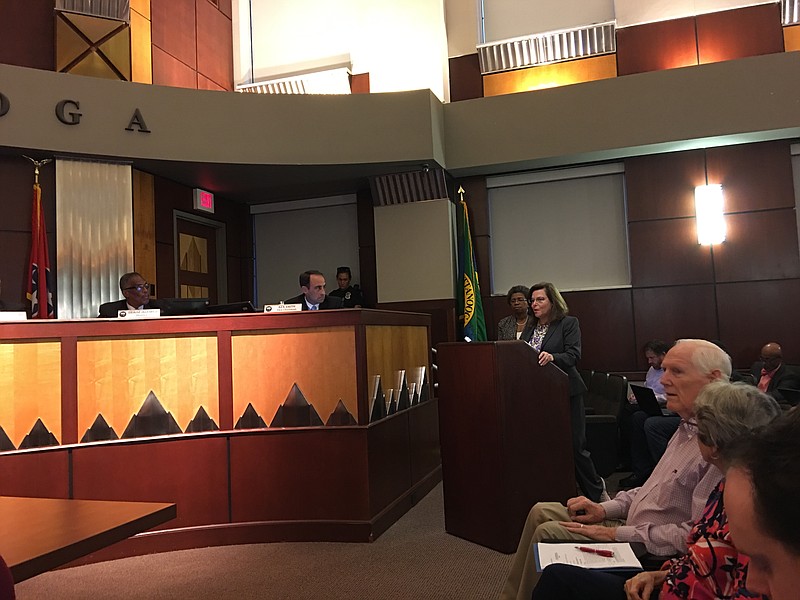The Chattanooga City Council gave its final approval to the city's 2018 budget of $253 million in an 8-1 vote on Tuesday night, marking a $23 million increase over last year and including a new property tax rate that may amount to an increased bill for many Chattanoogans.
City Finance Officer Daisy Madison said early last month the city faces a number of challenges, including increases to police and fire pensions, general pensions, post-employment benefits and medical costs.
Those expenses alone require an additional $11.1 million over last year, with fire and police pensions requiring $5.1 million more - about a 38 percent increase.
The budget includes a 3-cent reduction in the property tax rate per $100 of a home's value; however, the total amount paid in taxes is still expected to go up. That is because, overall, property values in Chattanooga have gone up by an average of 10.9 percent after a recent Hamilton County appraisal.
State law prohibits local governments from earning more revenue just because property values go up and provides them with certified tax rates to ensure tax revenues stay level. The certified tax rate for Chattanooga is $2.0573 per $100 of assessed value.
However, Mayor Andy Berke asked the council to move the rate to $2.277 per $100 of assessed value, representing a 21.97-cent increase over the state's certified rate. The increased tax rate will generate more money to help pay for major budgetary challenges, especially the underfunded police and fire pensions.
During a public hearing before the vote, Tiffany Rankins, secretary for the Lincoln Park neighborhood association, was the only person to oppose specifically the senior tax freeze and potential tax hike for some.
"The tax hike, for low-wage employees, is not very good," Rankins said. "The tax freeze is generally cut off at a certain level, and most senior citizens, unless you are just in low poverty, aren't approved for it."
The senior tax freeze is a state program adopted by the city for qualifying seniors with low- to moderate-income.
Councilman Chip Henderson was the only councilman to vote no. He also voted against the budget in its first reading on Sept. 5. After that vote, he said his opposition came from the wishes of his constituents. Henderson represents District 1, which includes Lookout Valley and portions of Mountain Creek and Hixson.
"The people I talked to made it very clear they didn't want a tax increase," Henderson told the Times Free Press after the meeting.
After Tuesday night's final vote, Henderson's reasons for voting no were the same - his constituents. He said they were very adamant about him not supporting the tax increase.
Many of Henderson's constituents have had an increase in property value, some even up to 20-25 percent or higher, he said. Their increase in property value will likely lead to higher taxes despite the lower rate.
"I had several of them call and thank me for voting no," he said. "... I want District 1 to know I am listening to them."
Contact staff writer Rosana Hughes at rhughes@timesfreepress.com or 423-757-6327. Follow her on Twitter @HughesRosana.
